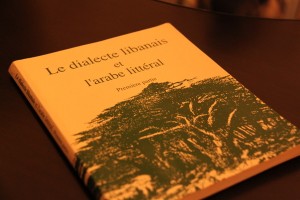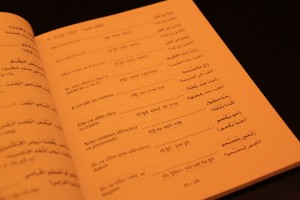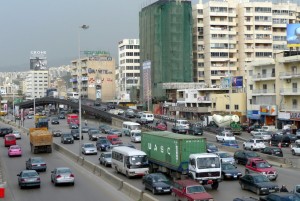The destruction of old properties in Beirut seems to be accelerating. Or maybe there are just fewer of these beauties left.
But how do YOU say it?

One of the few colloquial vs classical comparitive resources (Published by Haddad/Fadel in French or English)
One of the challenges of learning Arabic is its diglossic nature. The fact that two languages or different varieties of a language coexist – with one form used for writing and another, quite different, for conversation – can make life hard for would-be students.
For those wanting to learn the spoken dialects, it is difficult to find written resources and they must rely largely on speakers of the language, which you just can’t buy and take home. For those wanting to learn the written language, it is hard to get the oral practice one is used to in other languages. Standard Arabic may be heard in radio or television monologues but it is often mixed with some colloquial terms and is never “pure” in dialogue.
Defining diglossia appears simple enough. However, the perspective of a native speaker on these two varieties is by no means as clearcut. A strange hierarchical nature exists between the two which can affect a speaker’s perception of what and how s/he speaks.
I have often noticed that when I ask an Arabic speaker how they say a certain word in colloquial Lebanese, they tell me the (often very different) Standard Arabic word. It sometimes takes some prodding to get them to tell me the word they use on a day to day basis, the one you would expect to trip off their tongue first. I was fascinated to discover recently that this tendency is actually documented.
The linguist Charles Ferguson writes:
In all the defining languages the speakers regard H [the "high," or superposed variety] as superior to L [the "low," or colloquial variety] in a number of respects. Sometimes the feeling is so strong that H alone is regarded as real and L is reported “not to exist.” Speakers of Arabic, for example, may say (in L) that so-and-so doesn’t know Arabic. This normally means he doesn’t know H, although he may be a fluent, effective speaker of L. If a non-speaker of Arabic asks an educated Arab for help in learning to speak Arabic the Arab will normally try to teach him H forms, insisting that these are the only ones to use. Very often, educated Arabs will maintain that they never use L at all, in spite of the fact that direct observation shows that they use it constantly in all ordinary conversation. Similarly, educated speakers of Haitian Creole frequently deny its existence, insisting that they always speak French.
Even where the feeling of the reality and superiority of H is not so strong, there is usually a belief that H is somehow more beautiful, more logical, better able to express important thoughts, and the like. And this belief is held also by speakers whose command of H is quite limited. To those Americans who would like to evaluate speech in terms of effectiveness of communication it comes as a shock to discover that many speakers of language involved in diglossia characteristically prefer to hear a political speech or an expository lecture or a recitation of poetry in H even though it may be less intelligible to them than it would be in L.
He gives the examples not only of Arabic and its dialects and Haitian Creole but also of modern Greek and Swiss German.

French/English with Standard Arabic, Lebanese in script and transliterated Lebanese (click to enlarge)
The essay which quotes Ferguson makes a number of other valid points and is worth reading in full. The latter half highlights that both pure colloquial and pure standard Arabic rarely exist in spoken situations, existing as a continuum where one fades imperceptibly into the other and even the opposing poles are tainted.
It also discusses the effect of diglossia on native speakers’ perception and appreciation of literature. In addition, it points to the advantages of diglossia noting that when Latin effectively died Europe lost many cultural resources as well as the possibility of cross-border communication with communities in a much more extensive geographical area.
Which put me in mind of a what Amin Maalouf has to say on language and globalisation:
Qu’un Français et un Coréen puissent, en se retrouvant, s’exprimer l’un et l’autre en anglais [...] c’est sans doute un progrès par rapport au passé; mais qu’un Français et un Italien ne puissent plus se parler qu’en anglais est indiscutablement une régression, et un appauvrissement de leur relation.
All of which is an interesting way to pass time when I should be learning my Lebanese vocab…
Streets of Beirut XX
Irks and quirks
It has been a full year since I arrived in this exuberant scrap of a country. With time you get used to the irks and attached to the quirks. Here are a handful of typically Lebanese idiosyncrasies that still have me baffled.
1
Look out for upcoming bridges over the motorway. In the heat of summer these are a favourite point for crossing the six-lane highway as they cast a strip of cool shadow across the tarmac. Covering the crossings would at least provide the shade that people otherwise seek underneath at the risk of ending up under a pile-up.
2
It’s a cash culture. Forget your plastic friends and flash your cash instead. Daily life requires Read the rest of this entry »
Streets of Beirut XIX
A glimpse beyond a certain wall in Beirut. This capsule of green fills with excited horses and men on a Sunday afternoon. Check out a few photos from the event here.



